
 |
|
| |
|
ROXAS CITY'S DIWAL HARVEST SEAFOOD FESTIVAL ‘05
|
 |
The people of Roxas City and Capiz delectably refer to the endemic Pholas Orientalis or Angel Wing Shell as the Diwal which is a local term that means “to stick your tongue out”. What's in a name? Well, the shell is called such because when it is still alive and in its natural habitat which would be the rich coastal waters of Western Visayas, more so in Panay Island, it sticks out the lower portion of its mussel from under the sand to collect food particles that drift past it. When the shell is harvested, it sticks out the same tongue-like structure from the lower part of its shell to eject ingested seawater and sand in a process known to locals as “paluad”. Aside from the distinct, immaculately white shells of this bi-valve, earning it the name Angel Wings, the people of Western Visayas have also noticed the resemblance of its protruding mussel to a lolling tongue, hence the name “diwal”.
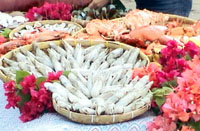 |
For over a decade, the diwal became almost extinct in the coastal waters of Western Visayas because of over harvesting and trawling by locals who found a lucrative business in selling diwal. The shell's ability to command a high retail price is due largely to the people's rising demand for it because of its sweet taste and tender mussel texture when broiled. Fortunately, when the local government of Roxas City, under the supervision of Mayor Antonio Del Rosario, the City Agricultural Services Office – Aquaculture Division, under Mr. Buddy Borda, and some marine experts from UPV-Miagao stepped in to rescue the dwindling population of the bi-valve, all harvesting was abruptly halted to save the much sought after diwal.
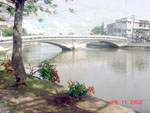 |
Now, after over a decade of intensive seeding of the coastal waters of Capiz, close supervision, illegalization of destructive harvesting and fishing practices, and heated conflicts between locals who have, through the years, insisted on carrying on with their harvest customs, the diwal has staged a come back. The years of commitment to the rescue of the distinct diwal has finally paid off.
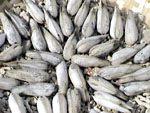 |
Last July 15-16, 2005, the local government of Roxas City, to celebrate the re-emergence of diwal in its coastal waters, held the first and only Diwal Harvest Seafood Festival in the country. As early as seven in the morning of July 15th, people from all over Panay Island and perhaps from all over the country, gathered at the diwal fair beside the Roxas City bandstand at the Roxas City Plaza awaiting the first baskets of diwal to be hauled in from the various harvest areas in the city. It was not until three in the afternoon, the scheduled official opening of the festival, when the first diver came in with the very first harvests of diwal from Punta Cogon. People swarmed over the bi-valves, and the shells vanished faster than you can say, “angel wings”. The people did miss having the delicious bivalve on their tables. That was not the only harvest though; moments later, more shells were carted in. People from neighboring cities and provinces bought tons of the bivalves to be brought back to where they came from. The fair could not close until almost eleven in the evening as people were still waiting in cue to buy their own share of the sought after diwal. The same scene greeted residents on the 16th of July; the fair continuing on to as late as midnight.
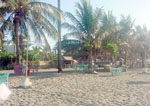 |
While people were elbowing themselves into the throngs of people wanting to get their hands on the diwal, a lively food festival was held in the adjacent plaza; the main menu – diwal. The air was filled with the all too familiar scent of charred shells and the distinct aroma of broiled diwal. People danced to several bands with beers in their hands. Tables were filled with plate after plate of the diwal standing out like little white feathers in the evening light.
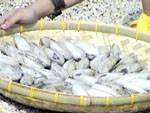 |
The diwal has returned and more than just a simple dismissive smile, such a re-emergence, through the efforts of the Roxas City government, deserves a celebration. Hopefully, with cooperation and commitment, we shall not miss the bivalve anymore as, currently, strict harvesting regulations are in place and the breeding beds of the bivalves are closely watched and protected. Diwal season has been calendared from July through October of every year with only two diving harvests scheduled every week; and as is customary, as the Diwal Season opens every year, we will all be treated to the annual thanksgiving celebration of the Diwal Harvest Seafood Festival. Be there next year, and see how angelic and heavenly these angel wings truly are, both gastronomically and aesthetically. See you next year!
(For more information on how to purchase diwal in commercial amounts, contact the Roxas City Mayor's Office at (036)6210-500)